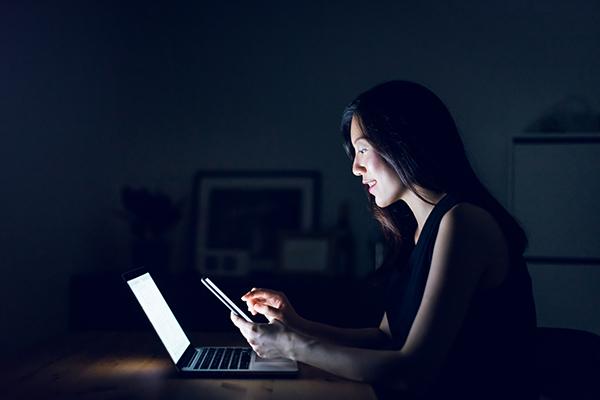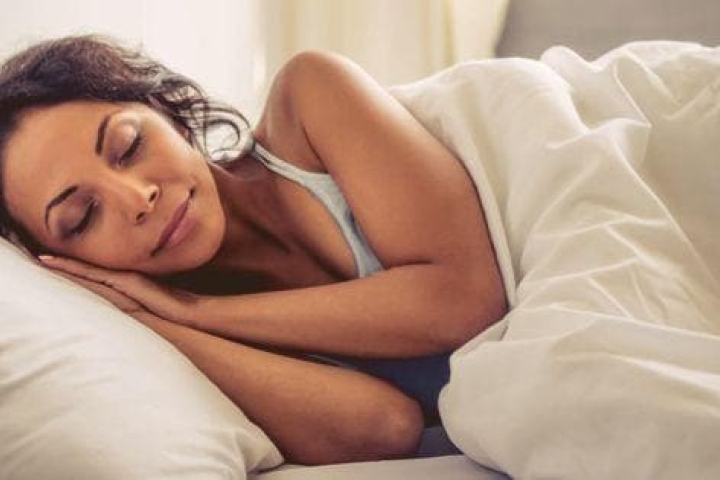Important Facts about Blue Light and Eye Health
Did you know the average person spends more than 11 hours in front of an electronic device every day? We look to our devices for everything from productivity and education to entertainment. But all that time in front of our computers, tablet devices, phone screens and televisions exposes us to harmful blue light that can add up over time and do some real damage to our eyes, not to mention our sleeping patterns.1
Studies have shown that too much blue light exposure can disrupt our circadian rhythm (our sleep and wake patterns), especially if we’re exposed to blue light sources at night, because blue light suppresses melatonin.2 Blue light exposure can also cause digital eye strain and eye fatigue, which can lead to blurry vision, difficulty focusing, dry and irritated eyes, headaches, fatigue, and even neck and back discomfort.
Thankfully, new research has shed some light on how we can help protect ourselves from blue light damage with two antioxidant carotenoids: lutein and zeaxanthin.
Lutein & Zeaxanthin for Vision Health
The protective qualities of macular carotenoids have been the focus of studies in numerous areas of health, but a recent study takes a deeper dive into how lutein and zeaxanthin work to support healthy retinas.
The study was published in Nutrients, an open-access journal of human nutrition. Researchers revealed that a specific blend of lutein and zeaxanthin, known as Lutemax® 2020, helps protect retinal photoreceptors against blue light damage by combating oxidative stress, which is the primary contributor to vision concerns related to blue light exposure.3
While this was a non-human study, it may have important implications in human health, especially given the onslaught of blue light exposure that we face each day.
What is Blue Light?
Why is blue light so different from other types of light? Put simply, blue light is one of the shortest, most energetic wavelengths of all visible light, so it’s more likely to damage your retina.4 Blue light is closer in the color spectrum to nonvisible, ultraviolet light than other visible light, like red or orange.5 The natural filters in your eyes don’t sufficiently protect against blue light damage.
Here are some eye-opening facts about blue light:
- More blue light is emitted from smart phones and tablet computers than from any other light source.6
- The average American adult spends more than 11 hours per day on electronic devices.1
- Teens spend an average of nine hours each day in front of a variety of screen types, including TVs, cell phones, computers and tablets. Tweens clock in at around five hours of screen time.7
- 71% of Americans say they haven’t discussed their digital device usage with their eye care provider. Many are unaware of steps they can take to combat digital eye strain.8
- More than half of Americans, both adults and children, are believed to suffer from digital eye strain.9
- Lutein and zeaxanthin are the only two carotenoids your body selects for protection in the eyes, but your body doesn’t make them naturally.10
Lutein and Zeaxanthin for Eye Health
One of the most effective ways to protect yourself against the damage blue light exposure can cause is to enrich your diet with lutein and zeaxanthin. These two carotenoids are in the same family of nutrients as beta-carotene, but they are specifically referred to as macular carotenoids because they are deposited in the retina when consumed.11
Lutein and zeaxanthin carry with them a yellow-orange pigmentation which absorbs blue light. The higher the density of macular pigment, the more protection you have against damaging light.4 Lutein and zeaxanthin also have potent antioxidant benefits and play a role in protecting your retina from the cumulative damage and oxidative stress that leads to age-related eye concerns.11
What the Experts Say About Blue Light and Lutein
Amy Sunderman, Director of Science & Innovation at Naturespan Health Products, was live on Facebook with Dr. Vijaya Juturu of OmniActive Health to discuss the preventative role of lutein in ocular health and defense against our daily exposure to blue light. Watch the replay below:
Ways to Support Eye Health Every Day
It isn’t possible to avoid blue light altogether, but you’ll want to take steps to protect yourself from the dangers of blue light as much as possible. Here are some tips for blue light protection:
- Limit screen time when not working. Grab a book, take a walk, choose screenless activities to limit blue light eye strain.
- Remember to blink, blink, blink when using electronics.
- Set a time for "lights out" for your devices in the evenings.
- Charge your devices in a room other than your bedroom.
- Limit your screen time before bed.
- Use night-time settings to minimize blue light exposure.
- Follow the 20-20-20 rule: Shift your eyes to look at an object at least 20 feet away for at least 20 seconds every 20 minutes.
- Consider adding supplements with lutein and zeaxanthin to your daily routine like our Vision Defense or Synergistic Eye Health for blue light eye protection.
Help Promote Eye Health with Lutein
Help protect your eyes from the effects of blue light by enriching your diet with supplements formulated specifically for ocular health. Look for supplements that contain both lutein and zeaxanthin, the two carotenoids that have been scientifically proven to protect against blue light damage. For example, our powerful Age Related Eye Support is specifically formulated to help promote eye health, especially for concerns about the effects of blue light, and provides additional antioxidant benefits from other nutrients like zinc, copper and vitamins C and E along with natural extracts of marigold flowers.
*These statements have not been evaluated by the Food and Drug Administration. These products are not intended to diagnose, treat, cure or prevent any disease.
About Lindsey Toth, MS, RDRegistered Dietitian, Naturespan Health Products
Lindsey is a nationally recognized registered dietitian and nutritionist with a soft spot for ice cream. She empowers people to take charge of their health by finding the balance between the pleasure and nourishment in food.
Her philosophy is that you should take care of your body because it’s the only permanent home you have. It’s what inspired her to pursue a career in nutrition and, ultimately, led her to Naturespan Health Products.
Sources
1. Always on: Media Usage Amounts to 10+ Hours Per Day. Statista. Read source
2. Blue Light has a Dark Side. Harvard Health Publishing. Read source
3. Lutein and Zeaxanthin Isomers. Nutrients. Read source
4. Dr. Vijaya Juturu on Blue Light and Lutein. Naturespan Health Products Facebook Live Video. Read source
5. Visible Light. NASA. Read source
6. How Blue Light Affects Your Sleep. WebMD. Read source
7. Screen Time and Children. American Academy of Child and Adolescent Psychiatry. Read source
8. The Vision Council. Read source
9. Digital Eye Strain. Optometrists Network. Read source
10. Diet & Nutrition. American Optometric Association. Read source
11. Macular Carotenoid Supplementation. National Library of Medicine. Read source





Leave a comment